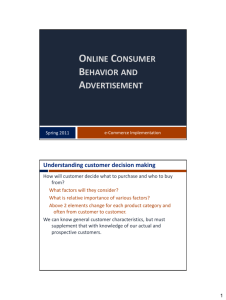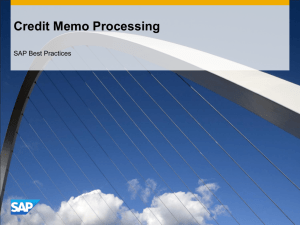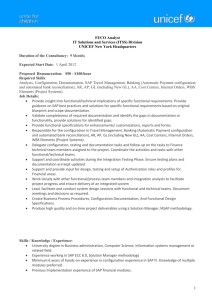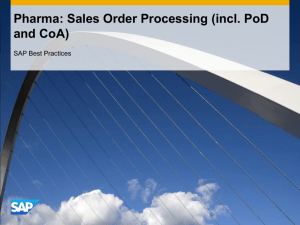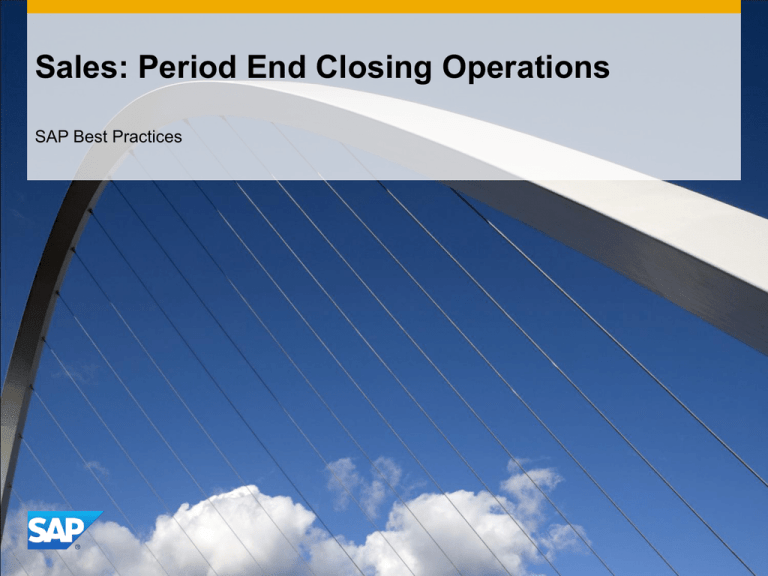
Sales: Period End Closing Operations
SAP Best Practices
Purpose, Benefits, and Key Process Steps
Purpose
This scenario describes the collection of periodic activities in Sales & Distribution such as
day ending activities or legal requirements.
Benefits
Provides a SD periodic activities overview
© 2012 SAP AG. All rights reserved.
‹#›
Purpose, Benefits, and Key Process Steps
Key Process Steps
Review blocked sales orders
Review incomplete sales orders
Review sales documents blocked for delivery
Review sales documents due for delivery
Review log of collective delivery creation
Review incomplete SD documents (deliveries)
Review outbound deliveries for goods issue
Review sales documents blocked for billing
Review billing due list
Review log of collective invoice creation
Review list blocked (for accounting) billing documents
Calculation of work in process (Service Provider)
Settling the sales order to profitability analysis (Service Provider)
ER1 Report
© 2012 SAP AG. All rights reserved.
‹#›
Required SAP Applications and Company Roles
Required SAP Applications
Eenhancement package 5 for SAP ERP 6.0
Company Roles
Billing Administrator
Sales Manager
Warehouse Clerk
Sales Administrator
Warehouse Manager
Accounts Receivable Manager
Customs Agent
Product Cost Controller
Excise Clerk
© 2012 SAP AG. All rights reserved.
‹#›
Detailed Process Description
Sales: Period End Closing Operations
Review Blocked Sales Orders: The sales order failed the credit check. In this activity, you review blocked sales orders and resolve any credit
issues.
Review Incomplete Sales Orders: This activity displays a list of all incomplete documents that is based on the specified selection criteria.
Review Sales Documents Blocked for Delivery: It shows sales orders that are on credit hold and need to be released by the credit department
Frequency.
Review Sales Orders Due for Delivery: Sales orders become due for delivery creation according to their schedule line. The schedule line becomes
due for shipping, when the material availability and the transportation scheduling date for a schedule are reached.
Review Log of collective delivery creation: This log provides the detailed reasons why a delivery creation has failed. Use this log to identify the
reasons and solve the issues.
Review Incomplete SD Documents (deliveries): In this activity, you review sales orders that are not complete by using the applied incompletion
procedure.
Review Outbound Deliveries for Goods Issue: In this activity, you review deliveries that are due for goods issue.
Review Sales Documents blocked for billing: This log provides the detailed reasons why a delivery creation has failed. Use this log to identify the
reasons and solve the issues.
Review Billing Due List: When processing the billing due list, you do not need to enter the individual documents to be invoiced. The system lists the
documents to be invoiced on the basis of the selection criteria you enter. It can also combine several deliveries in one invoice.
Review Log of collective invoice creation: This log provides the detailed reasons why an invoice creation has failed. Use this log to identify the
reasons and solve the issues.
Review List Blocked (for accounting) Billing Documents: This log provides the detailed reasons why a billing document is blocked for accounting.
Use this list to identify the reasons and solve the issues.
Calculation of Work In Process (Service Provider): Results analysis is used to evaluate the progress of sales orders on the basis of planned and
actual revenues and costs.
Settling the Sales Order to Profitability Analysis (Service Provider): The settlement process moves all revenues from the sales order to a controlling
object for profitability analysis.
© 2012 SAP AG. All rights reserved.
‹#›
Process Flow Diagram
Warehouse
Manager
Review log of
collective
delivery
creation
Warehouse
Clerk
Review sales
orders due for
delivery
Product
Cost
Controller
Calculation of
Work in
Process
(Service
Provider)
Sales
Manager
Review
incomplete
sales orders
Sales
Administratior
Review log of
collective
invoice
creation
Billing
Administr
ator
Review
blocked Sales
Orders
Review billing
due list
Account
s
Receiva
ble
Manager
Review sales
documents
blocked for
billing
Review list
blocked (for
accounting)
billing
documents
Excise
Clerk
Sales: Period End Closing Operations
Update
Registers
Extract
Registers
Review
incomplete SD
documents
(deliveries)
Review
outbound
deliveries for
goods issue
Settling the
Sales Order to
Profitability
Analysis
(Service Prov.)
Review sales
documents
blocked for
delivery
Monthly
Utilization
ER1 Report
Sales: Period End Closing Operations contains no process flow just single
process steps
© 2012 SAP AG. All rights reserved.
‹#›
Legend
<Function>
Symbol
Description
Usage Comments
Band: Identifies a user role, such as Accounts
Payable Clerk or Sales Representative. This band
can also identify an organization unit or group,
rather than a specific role.
Role band contains
tasks common to that
role.
Symbol
Diagram
Connection
The other process flow symbols in this table go
into these rows. You have as many rows as
required to cover all of the roles in the scenario.
External
to SAP
External Events: Contains events that start or end
the scenario, or influence the course of events in
the scenario.
Business
Activity / Event
SubProcess
Reference
Process
Decision
Flow line (solid): Line indicates the normal sequence
of steps and direction of flow in the scenario.
Flow line (dashed): Line indicates flow to
infrequently-used or conditional tasks in a
scenario. Line can also lead to documents involved
in the process flow.
Connects two tasks in
a scenario process or
a non-step event
Business Activity / Event: Identifies an action that
either leads into or out of the scenario, or an
outside Process that happens during the scenario
Does not correspond
to a task step in the
document
Unit Process: Identifies a task that is covered in a
step-by-step manner in the scenario
Corresponds to a task
step in the document
To next / From last Diagram: Leads
to the next / previous page of the
Diagram
Flow chart continues on the next /
previous page
Hardcopy / Document: Identifies a
printed document, report, or form
Does not correspond to a task
step in a document; instead, it is
used to reflect a document
generated by a task step; this
shape does not have any outgoing
flow lines
Financial Actuals: Indicates a
financial posting document
Does not correspond to a task
step in a document; instead, it is
used to reflect a document
generated by a task step; this
shape does not have any outgoing
flow lines
Budget Planning: Indicates a
budget planning document
Does not correspond to a task
step in a document; instead, it is
used to reflect a document
generated by a task step; this
shape does not have any outgoing
flow lines
Manual Process: Covers a task
that is manually done
Does not generally correspond to
a task step in a document;
instead, it is used to reflect a task
that is manually performed, such
as unloading a truck in the
warehouse, which affects the
process flow.
Existing Version / Data: This block
covers data that feeds in from an
external process
Does not generally correspond to
a task step in a document;
instead, this shape reflects data
coming from an external source;
this step does not have any
incoming flow lines
System Pass / Fail Decision: This
block covers an automatic
decision made by the software
Does not generally correspond to
a task step in the document;
instead it is used to reflect an
automatic decision by the system
that is made after a step has been
executed.
Financial
Actuals
Process Reference: If the scenario references
another scenario in total, put the scenario number
and name here.
Corresponds to a task
step in the document
Sub-Process Reference: If the scenario references
another scenario in part, put the scenario number,
name, and the step numbers from that scenario
here
Corresponds to a task
step in the document
Process Decision: Identifies a decision / branching
point, signifying a choice to be made by the end
user. Lines represent different choices emerging
from different parts of the diamond.
Does not usually
correspond to a task
step in the document;
Reflects a choice to
be made after step
execution
© 2012 SAP AG. All rights reserved.
Usage Comments
Hardcopy /
Document
Budget
Planning
Unit Process
Process
Reference
Description
Manual
Process
Existing
Version /
Data
System
Pass/Fail
Decision
‹#›
© 2012 SAP AG. All rights reserved
No part of this publication may be reproduced or transmitted in any form or for any purpose
without the express permission of SAP AG. The information contained herein may be
changed without prior notice.
Some software products marketed by SAP AG and its distributors contain proprietary
software components of other software vendors.
Microsoft, Windows, Excel, Outlook, PowerPoint, Silverlight, and Visual Studio are
registered trademarks of Microsoft Corporation.
IBM, DB2, DB2 Universal Database, System i, System i5, System p, System p5, System x,
System z, System z10, z10, z/VM, z/OS, OS/390, zEnterprise, PowerVM, Power
Architecture, Power Systems, POWER7, POWER6+, POWER6, POWER, PowerHA,
pureScale, PowerPC, BladeCenter, System Storage, Storwize, XIV, GPFS, HACMP,
RETAIN, DB2 Connect, RACF, Redbooks, OS/2, AIX, Intelligent Miner, WebSphere, Tivoli,
Informix, and Smarter Planet are trademarks or registered trademarks of IBM Corporation.
Linux is the registered trademark of Linus Torvalds in the United States and other countries.
Adobe, the Adobe logo, Acrobat, PostScript, and Reader are trademarks or registered
trademarks of Adobe Systems Incorporated in the United States and other countries.
Oracle and Java are registered trademarks of Oracle and its affiliates.
UNIX, X/Open, OSF/1, and Motif are registered trademarks of the Open Group.
Citrix, ICA, Program Neighborhood, MetaFrame, WinFrame, VideoFrame, and MultiWin are
trademarks or registered trademarks of Citrix Systems Inc.
HTML, XML, XHTML, and W3C are trademarks or registered trademarks of W3C®, World
Wide Web Consortium, Massachusetts Institute of Technology.
Apple, App Store, iBooks, iPad, iPhone, iPhoto, iPod, iTunes, Multi-Touch, Objective-C,
Retina, Safari, Siri, and Xcode are trademarks or registered trademarks of Apple Inc.
IOS is a registered trademark of Cisco Systems Inc.
INTERMEC is a registered trademark of Intermec Technologies Corporation.
Wi-Fi is a registered trademark of Wi-Fi Alliance.
Bluetooth is a registered trademark of Bluetooth SIG Inc.
Motorola is a registered trademark of Motorola Trademark Holdings LLC.
Computop is a registered trademark of Computop Wirtschaftsinformatik GmbH.
SAP, R/3, SAP NetWeaver, Duet, PartnerEdge, ByDesign, SAP BusinessObjects Explorer,
StreamWork, SAP HANA, and other SAP products and services mentioned herein as well
as their respective logos are trademarks or registered trademarks of SAP AG in Germany
and other countries.
Business Objects and the Business Objects logo, BusinessObjects, Crystal Reports, Crystal
Decisions, Web Intelligence, Xcelsius, and other Business Objects products and services
mentioned herein as well as their respective logos are trademarks or registered trademarks
of Business Objects Software Ltd. Business Objects is an
SAP company.
Sybase and Adaptive Server, iAnywhere, Sybase 365, SQL Anywhere, and other Sybase
products and services mentioned herein as well as their respective logos are trademarks or
registered trademarks of Sybase Inc. Sybase is an SAP company.
Crossgate, m@gic EDDY, B2B 360°, and B2B 360° Services are registered trademarks
of Crossgate AG in Germany and other countries. Crossgate is an SAP company.
All other product and service names mentioned are the trademarks of their respective
companies. Data contained in this document serves informational purposes only. National
product specifications may vary.
The information in this document is proprietary to SAP. No part of this document may be
reproduced, copied, or transmitted in any form or for any purpose without the express prior
written permission of SAP AG.
RIM, BlackBerry, BBM, BlackBerry Curve, BlackBerry Bold, BlackBerry Pearl, BlackBerry
Torch, BlackBerry Storm, BlackBerry Storm2, BlackBerry PlayBook, and BlackBerry App
World are trademarks or registered trademarks of Research in Motion Limited.
Google App Engine, Google Apps, Google Checkout, Google Data API, Google Maps,
Google Mobile Ads, Google Mobile Updater, Google Mobile, Google Store, Google Sync,
Google Updater, Google Voice, Google Mail, Gmail, YouTube, Dalvik and Android are
trademarks or registered trademarks of Google Inc.
© 2012 SAP AG. All rights reserved.
‹#›



